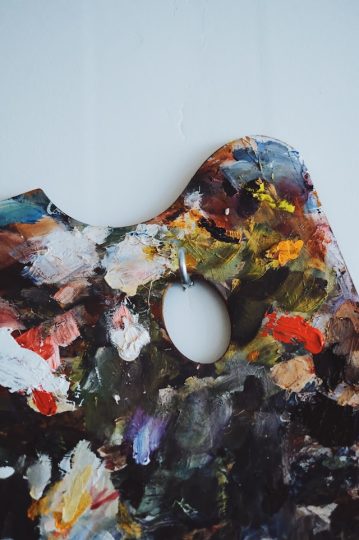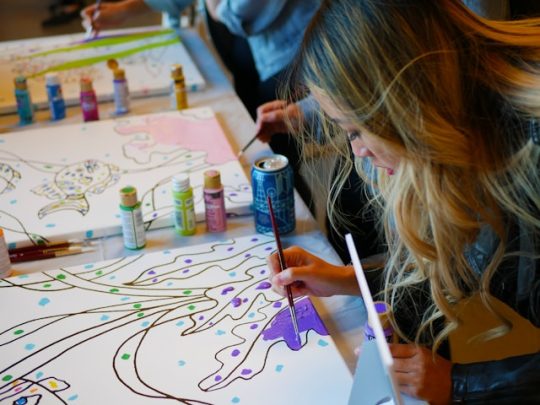Could an artist mentor be your secret weapon? Very few of us succeed when going it alone, and many well-known, accomplished, and successful creatives have sought the help of a mentor to help guide their practice and navigate their careers. This is even true of some of the greats: consider Vincent van Gogh and Paul Gauguin, who met in 1887 and became fast friends. Their unique approach to color and light led van Gogh to invite Gauguin to stay with him in Arles, France, where the two artists learned from one another and worked to develop new techniques.
A prolific period of creation and innovation, this was also the foundation for what van Gogh had hoped would become his very own artist’s collective. And while it was never formalized, it was partnerships like this that led to the birth of Fauvism, an art style defined by strong colors and fierce brushwork. With the involvement of other titans like Matisse and Derain, modern art heralded in a bold and innovative new style that would change the course of art history forever.

Stoke your creativity with the help of an artist mentor.
Without an artist mentor, it’s entirely possible that this new way of working may have never been discovered, revealing the importance of identifying potential mentors when developing your art practice. Do you ever think about the people in your life that you admire or who have left a lasting impression? Who has motivated you, guided you, taught you, or inspired you? Hopefully, there have been many people throughout your life that have inspired you with their knowledge, vision, insight, and success—your mentors.
Whether you’re an established visionary or just graduating from art school, the “real world” can feel frightening and cause stress. But an artist mentor can provide you with advice, counsel, expertise, encouragement, and the kind words you need to achieve your goals.
Artist mentors can also hold you accountable when you’re getting off-track, provide resources when you need clarity, build your confidence, and pave the way to help you succeed. Remember this: an artist mentor has been down this road before. Take advantage of their experiences and seize the opportunity to learn from their mistakes and successes.
Why find an artist mentor
It’s no secret that the art world can be a tough industry to break into, so give yourself an advantage and lean on an artist mentor to share their experiences and discuss their career path. Have they made an unfortunate decision in the past that threw them off course? Ask them about it and what they might have done differently. Or perhaps there was a pivotal conversation they once had that altered the trajectory of their career. Regardless of what they’ve experienced, a seasoned artist mentor will be able to dispense words of wisdom that can alter the course of your career.
Just remember: your relationship with your artist mentor is meant to be collaborative, and their main objective is to guide you—not hold your hand every step of the way. A good artist mentor will show you the ropes and equip you with the tools you need to succeed while allowing you to grow on your own.
Imagine that you’re a very shy and timid person, for example. While your artist mentor can empower you with kind words and motivation, it’s ultimately up to you to challenge yourself and get out there. Do you answer the call and push yourself to attend more social and networking events? We know it isn’t easy, but sometimes ‘immersion therapy’ is the only answer. Look for openings or other opportunities to connect with other professionals in your field. Not only will it challenge you to grow, it might also be the key to unlocking a future you never thought possible.

No one can help give you that “eureka” moment quite like an artist mentor.
Finding the best candidates
When you’re searching for an artist mentor, the first crucial step is to target someone in the industry that is succeeding in ways you find admirable. Their success means they’ve employed strategies that have set them apart in a competitive industry—and these strategies hold important clues as to how you might also propel your career forward.
Next, you’ll want to make sure that your potential artist mentor actually has the time to manage the relationship. It goes without saying, but they won’t be able to help you if their lives are already jam packed. And choosing an artist mentor whose personality, vision, and skill set aligns with your own not only benefits you professionally, but it will give you an edge when vying for their precious time. Simply put, if they like you and they like your work, then there’s a better chance that they’ll set aside the time to accommodate you.
Where to find an artist mentor
Without immediate personal connections, it can feel daunting to find an artist mentor. Considering that many professional creatives work on their own in the studio or in other bespoke spaces, you’ll want to get a little creative in terms of how you approach your search.
You can look to social media and connect with a potential mentor on Linkedin or Instagram, slowly build a relationship, and see if they might consider making time for you. Or, you can ask a boss or former professor to coffee to discuss your trajectory and ask for advice. One final idea? Do a little research and see if there are organizations or meetup groups in your area that bring other creatives together. Networking with like minded individuals is an unparalleled way to learn and get ahead. Don’t be afraid to put yourself out there—it’s an opportunity to grow and connect, and you can never be too proactive in your quest to find an artist mentor.

Feeling off course? Mentorship can get you back on track.
Rules for a healthy artist mentor relationship
Your artist mentor is doing you a huge favor: make it your responsibility to maintain the relationship, and never underestimate the importance of gratitude. That means being on time for meetups and phone calls, keeping conversations short and sweet, and regularly thanking them for their time. There’s a good chance that your artist mentor is already juggling a busy schedule, so be sure that, when you do connect, you have a specific question or idea in mind.
Demonstrate initiative and be clear with your artist mentor about the specific goals or intentions you have for your career and future. Share your work, ask for their honest feedback, and take their criticisms with grace: it might not feel good, but there’s an excellent chance that their words hold clues as to what’s been holding you back.
If you’re feeling bold, you might ask them to put you in touch with other art world players, like collectors, art directors, and gallery owners. When you meet them, be polite but clear in your intentions and try to pick their brains. You might even attend museum and gallery exhibitions to get a sense of the current art scene, what they think about the art market, and their predictions about where things are headed.
Show up for your artist mentor
It takes two to tango, and behaving unprofessionally or forgetting to express your gratitude can have a profoundly negative effect on your relationship with your artist mentor—and one that can have catastrophic consequences on your career. Don’t forget to keep your appointments, and if something unfortunately comes up, let them know as soon as possible so that they aren’t left spinning their wheels. You might even offer support, if the opportunity presents itself. For example, if they have an exhibition that they’ve been working towards, make sure to attend the opening and maybe offer a little token of congratulations. Or, if they’re offering an online course that is reasonably priced, consider signing up. Not only is it a nice thing to do, it’s a clear signal that you think their words and wisdom contain real world value.
Have you been going it alone? Do you long to have someone you admire professionally in your orbit? An artist mentor can offer emotional support, professional critiques of your work, and even connect you with other professionals. The first step in securing one is to just put yourself out there. Be bold—you never know who might open new doors.
Have you benefitted from the help of an artist mentor in your career? How have they changed things for you? Let us know in the comments.
